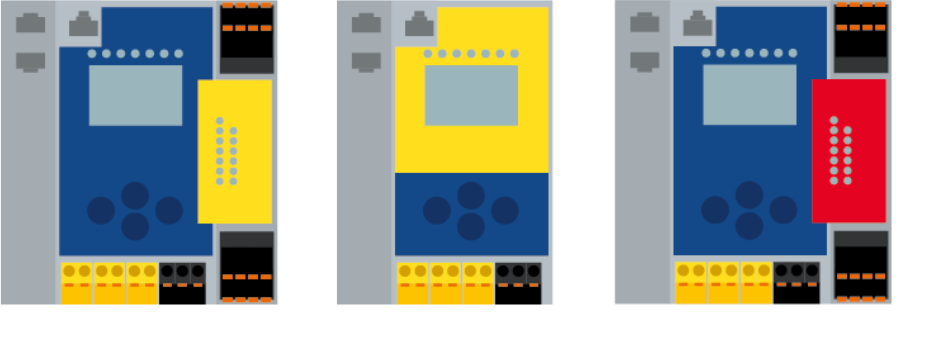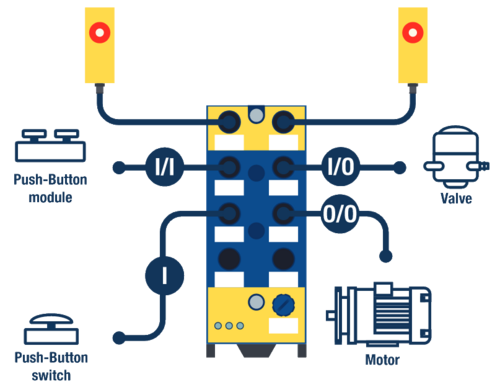ASi-5 Safety
The latest gateways, cost-saving input modules, and the first configurable I/O module with 2 safe outputs are available
ASi-5 Safety is certified and ready for use and complements optimally the established ASi Safety. The latest Safety generation can be easily integrated into existing solutions. Main advantage of ASi-5 Safety: You can use many safe and non-safe signals under just a single address.
Discover now our new ASi-5/ASi-3 Gateway family with integrated ASi-5 Safety - as well as the first ASi-5 Safety input modules, each with 4 x 1 channel or 2 x 2 channel safe inputs and up to 12 standard signals. With them, you can, for example, implement cost-effectively the connection of an operating panel to ASi - with several light buttons, an emergency stop button and a safe key switch.
The first configurable ASi-5 Safety Module with up to 14 safe inputs and 2 safe outputs (up to PLe) is a true “all-rounder”. The safe inputs can be configured for almost any sensor, whether OSSD or floating contacts – each as standard or antivalent switches. Thanks to this maximum flexibility, you can use the I/O module for almost all safety applications. Another advantage: Cyclic diagnostics of the safe inputs and outputs are always provided.
Content
- ASi-5 Safety input modules cost-saving for many applications
- The latest gateways, cost-saving input modules, and the first configurable I/O module with 2 safe outputs are available
- The advantages of our first ASi-5 Safety modules
- Modern ASi-5 Safety Gateways
- Configurable ASi-5 Safety I/O Module for flexible use in almost all applications
- FAQs about ASi-5 Safety

Flexible I/O module
with safe outputs
The configurable ASi-5 Safety I/O module BWU4277 offers up to 14 safe inputs and 2 safe outputs (up to PLe). Thanks to its maximum flexibility, the module can be used for almost all safety applications.
Modern ASi-5 Safety Gateways
ASi-5/ASi-3 Safety Gateways are currently the most advanced ASi masters – thanks in part to their chip card, which makes it easy to replace devices: if you insert the card into a new gateway with the same article number, all previous information is transferred: the safety and hardware configuration, parameter data of connected devices, and user comments. Many different variants are available: ASi-5/ASi-3 Safety Gateways for Ethernet-based fieldbus systems with and without safe fieldbus communication and with and without integrated safe local I/Os.
Configurable ASi-5 Safety I/O Module
for flexible use in almost all applications
The first flexibly configurable ASi-5 Safety Module BWU4277 with up to 14 safe inputs and 2 safe outputs (up to PLe) can be used for almost all safety applications. The safe inputs can be configured for almost any sensor, whether OSSD or floating contacts – in each case as standard or antivalent switches.

Save valuable resources
With AS-Interface, you do not need expensive plugs or sockets and only a single cable. This significantly reduces assembly times and material costs. In addition, valuable resources such as copper or plastic, which are required to manufacture the components, can be saved on a large scale. And energy consumption during cable production is greatly reduced. There is also a positive environmental effect when it comes to disposal – less waste is produced.
There are already many different safety controllers and solutions on the market, but unfortunately the same is also true for the number of functionally safe protocols used and the fieldbus itself.
Fieldbus independence has always been a great strength of ASi and ASi Safety. There are gateways for almost all relevant fieldbuses and safety protocols. This makes the system architecture at the I/O level completely independent of the used controller, which means that it can be standardized across all applications.
Needless to say, this advantage also applies to ASi-5 Safety. Just as with the introduction of ASi-5 in the standard area, ASi-5 Safety also offers many new options. The higher data bandwidth and extended diagnostic and parameterization options are ideal for resource-intensive applications.
This for example, makes the future implementation of IO-Link Safety possible.
ASi-5 Safety has been an integral part of ASi-5 from the very beginning: both use the same communication technology. In the case of ASi-5 Safety modules, only the normatively required protection of the data is added - with an additional checksum.This makes the transmission of these signals functionally safe up to SIL 3/PLe. This is essential whenever standards require such functional safety to protect people and the environment.
Just like ASi-3 Safety at Work, ASi-5 Safety was once again tested and certified externally according to applicable functional safety standards. Similarly, the process used for ASi-5 Safety achieves a performance level up to PLe according to ISO 13849-1, or a safety integrity level up to SIL3 according to IEC 61508/62061.
Of course, even standard sensors can be connected to ASi-5 Safety modules. With many modules, it is even possible to reconfigure connections so that the signal of the standard sensor is only transmitted via the standard protocol. This especially conserves communication resources such as addresses and bandwidth for ASi-3 Safety modules.
An additional advantage of ASi-5 Safety is that many safe and standard signals can be connected and transmitted over a single address. This saves resources and above all costs.
The topic of cyber security is more relevant than ever. In the industrial sector, the reliability of processes and production in particular is becoming increasingly important.
Like the standard ASi-5 communication, ASi-5 Safety is almost tap-proof due to the nature of the system. The reason: the data transfer via OFDM with dynamic frequency assignment,makes it very complex to capture the exchanged messages. This requires the entire context of the connection set-up between ASi master and ASi node. Besides, the clock frequencies must be precisely synchronized just like between the ASi master and ASi node according to the ASi-5 protocol.
Cyber security is also enhanced by the fact that the gateway creates a logical break between TCP/IP, ASi-5, and ASi-5 Safety. This means that high safety requirements only need to be placed on the ASi-5 Master, which establishes the connection to TCP/IP. ASi-5 modules, on the other hand, are much less problematic in terms of safety, since they cannot communicate over TCP/IP networks. Those responsible for network security can thus focus on significantly fewer devices and check them more carefully.
ASi-5 Safety is very flexible: depending on the profile and application scenario, 1 to 64 safe process data along with additional standard – each bidirectional – can be exchanged with one module. In the process, cycle times of up to 1.27 ms can be achieved for up to 16 safe inputs and 16 safe outputs each. Available diagnostics and acyclic services have no influence on the cycle times.
As an integral part of ASi-5, ASi-5 Safety can transmit safe and standard data simultaneously. Up to 32 bytes are available cyclically for this purpose. The safe data always has a 1-byte checksum, which enables safe communication up to level SIL3/PLe. As with pure ASi-5 standard modules, there is also a diagnostic and an acyclic channel. This also allows ASi-5 Safety modules to transmit detailed diagnostic messages in case of an event. An additional high-performance method is also available to read out additional information if required – e.g., for predictive maintenance or similar applications.
ASi-5 Safety uses the same mechanisms as all other ASi-5 modules. This means that it provides cyclic data along with an event-based diagnostic channel and an acyclic channel for reading out numerous indices. These indices cover a wide range of information: manufacturer, model name, the ASi ID for unique identification, module temperature, measured currents or an hour meter, to name a few." OPC UA enables this information to be transmitted to IT for evaluation..
This can save considerable costs in applications with multiple signals. ASi-3 Safety can also be used for modules that have many signals. In this case, however, each safe signal occupies a separate address. Just as with ASi-5, ASi-5 Safety can process much more data per master and thus greatly reduce connection costs – thanks to the significantly higher data bandwidth per address. For example, with the ASi-5 Safety module BWU4210, a total of 2x2-channel safe inputs and an additional 12 I/Os are available under just one ASi-5 address. In contrast, the same amount of data occupies 2 single and 3 A/B addresses with ASi-3.
However, ASi-5 may not always be the most advantageous one. Even with ASi-3 Safety, only one address is occupied for a single E-stop with a 2-channel safe input – and at lower cost. Both technologies will therefore be used in parallel in the future.
ASi-5 and ASi-3 operate independently and in parallel on the same two-conductor cable with the same electromechanics. Only one gateway with a combined ASi-5/ASi-3 master is required when using both protocols in one installation. The same applies to ASi-5 Safety and ASi-3 Safety – all that is needed is a gateway with a combined master and a combined ASi-5/ASi-3 safety monitor. In the simplest case, it is therefore possible to just replace the gateway in an existing system with ASi-3 Safety. The system can then continue to operate without changes, and ASi-5 Safety modules can be easily added if necessary.













